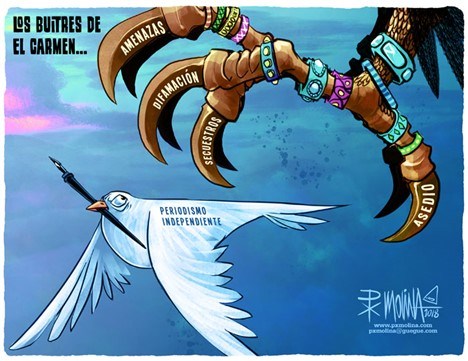
After La Prensa’s coverage of the expulsion of the Missionaries of Charity from the country, the Police sought to imprison us.
By Geovanny Shiffman (Confidencial)
HAVANA TIMES – “Mom, if the Police ever come looking for me at the house, tell them I haven’t lived here for years…” I would repeatedly tell my mother every time I went to or returned from a journalistic coverage for La Prensa newspaper, where I worked.
In Nicaragua, journalism has been persecuted, censored, and criminalized by the regime of Daniel Ortega and Rosario Murillo since 2018. By 2022, several journalists were in jail for practicing their profession, many of us had been assaulted by the Police and regime sympathizers, and three independent media outlets—La Prensa, CONFIDENCIAL, and 100% Noticias—had been closed and confiscated, and dozens of colleagues had gone into exile to avoid prison.
I would say those words to my mother almost automatically, preparing for the worst but also hoping for the best: despite the context, I never believed that the cruelty of the dictatorship would also reach me.
When I started in journalism, back in 2015, I was enthusiastic about the profession. I liked reporting from the streets, interviewing citizens, and bringing “hot” news to the public. I was happy doing my job. But the low salary forced me to change jobs to earn more money in a personal business.
The brutal repression of the Ortega-Murillo regime, starting in 2018, revived in me the need to report what was happening in Nicaragua. I wanted to be part of the generation of journalists documenting the new insurrection brewing in the country, and in 2019, I had an opportunity to return to journalism. My friend and colleague, Álvaro Navarro, opened the doors for me at his digital media outlet Artículo 66, where I resumed news coverage of the country.
My commitment to journalism was to show what was happening in that tumultuous Nicaragua. Gradually, the violence I covered came closer to me: after covering a civil protest, I was physically assaulted by Police officers; on another occasion, I was chased, surrounded, and threatened with jail. I kept repeating those ominous words to my mother.
I wrote many stories about colleagues announcing their exile, accounts of journalists in hiding, all forced to escape the regime’s clutches. “It must be tough to leave family behind,” I thought, but at the same time, I felt distant from that reality.
It may seem naive that I didn’t feel in the crosshairs of the dictatorship, as not only was I a journalist, but I had also been assaulted several tim


